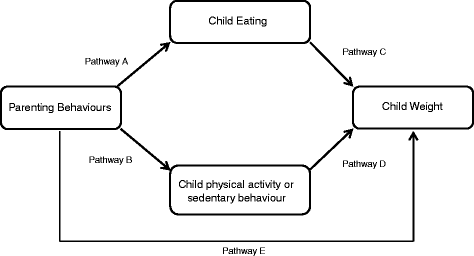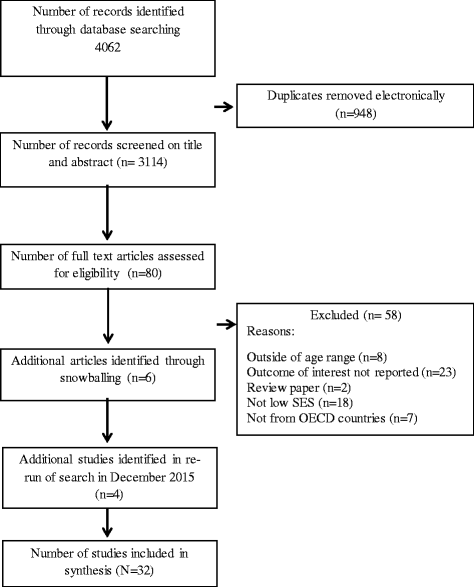Effects of parent and child behaviours on overweight and obesity in infants and young children from disadvantaged backgrounds: systematic review with narrative synthesis
- PMID: 26875107
- PMCID: PMC4753044
- DOI: 10.1186/s12889-016-2801-y
Effects of parent and child behaviours on overweight and obesity in infants and young children from disadvantaged backgrounds: systematic review with narrative synthesis
Abstract
Background: Despite the crucial need to develop targeted and effective approaches for obesity prevention in children most at risk, the pathways explaining socioeconomic disparity in children's obesity prevalence remain poorly understood.
Methods: We conducted a systematic review of the literature that investigated causes of weight gain in children aged 0-5 years from socioeconomically disadvantaged or Indigenous backgrounds residing in OECD countries. Major electronic databases were searched from inception until December 2015. Key words identified studies addressing relationships between parenting, child eating, child physical activity or sedentary behaviour and child weight in disadvantaged samples.
Results: A total of 32 articles met the inclusion criteria. The Mixed Methods Appraisal Tool quality rating for the studies ranged from 25 % (weak) to 100 % (strong). Studies predominantly reported on relationships between parenting and child weight (n = 21), or parenting and child eating (n = 12), with fewer (n = 8) investigating child eating and weight. Most evidence was from socio-economically disadvantaged ethnic minority groups in the USA. Clustering of diet, weight and feeding behaviours by socioeconomic indicators and ethnicity precluded identification of independent effects of each of these risk factors.
Conclusions: This review has highlighted significant gaps in our mechanistic understanding of the relative importance of different aspects of parent and child behaviours in disadvantaged population groups.
Figures


Similar articles
-
Physical activity, diet and other behavioural interventions for improving cognition and school achievement in children and adolescents with obesity or overweight.Cochrane Database Syst Rev. 2018 Mar 2;3(3):CD009728. doi: 10.1002/14651858.CD009728.pub4. Cochrane Database Syst Rev. 2018. PMID: 29499084 Free PMC article.
-
Physical activity, diet and other behavioural interventions for improving cognition and school achievement in children and adolescents with obesity or overweight.Cochrane Database Syst Rev. 2018 Jan 29;1(1):CD009728. doi: 10.1002/14651858.CD009728.pub3. Cochrane Database Syst Rev. 2018. Update in: Cochrane Database Syst Rev. 2018 Mar 02;3:CD009728. doi: 10.1002/14651858.CD009728.pub4. PMID: 29376563 Free PMC article. Updated.
-
Diet, physical activity and behavioural interventions for the treatment of overweight or obese children from the age of 6 to 11 years.Cochrane Database Syst Rev. 2017 Jun 22;6(6):CD012651. doi: 10.1002/14651858.CD012651. Cochrane Database Syst Rev. 2017. PMID: 28639319 Free PMC article.
-
Parent training interventions for Attention Deficit Hyperactivity Disorder (ADHD) in children aged 5 to 18 years.Cochrane Database Syst Rev. 2011 Dec 7;2011(12):CD003018. doi: 10.1002/14651858.CD003018.pub3. Cochrane Database Syst Rev. 2011. PMID: 22161373 Free PMC article.
-
Strategies for enhancing the implementation of school-based policies or practices targeting risk factors for chronic disease.Cochrane Database Syst Rev. 2017 Nov 29;11(11):CD011677. doi: 10.1002/14651858.CD011677.pub2. Cochrane Database Syst Rev. 2017. Update in: Cochrane Database Syst Rev. 2022 Aug 29;8:CD011677. doi: 10.1002/14651858.CD011677.pub3. PMID: 29185627 Free PMC article. Updated.
Cited by
-
Factors associated with underweight, overweight, and obesity in Chinese children aged 3-14 years using ensemble learning algorithms.J Glob Health. 2025 Feb 7;15:04013. doi: 10.7189/jogh.15.04013. J Glob Health. 2025. PMID: 39913538 Free PMC article.
-
"Associations between maternal perceptions of social support and adolescent weight status: A longitudinal analysis".SSM Popul Health. 2024 Mar 5;25:101647. doi: 10.1016/j.ssmph.2024.101647. eCollection 2024 Mar. SSM Popul Health. 2024. PMID: 38495803 Free PMC article.
-
The Metabolic Syndrome, a Human Disease.Int J Mol Sci. 2024 Feb 13;25(4):2251. doi: 10.3390/ijms25042251. Int J Mol Sci. 2024. PMID: 38396928 Free PMC article. Review.
-
Family-based intervention to prevent childhood obesity among school-age children of low socioeconomic status: study protocol of the FIVALIN project.BMC Pediatr. 2021 May 21;21(1):246. doi: 10.1186/s12887-021-02697-x. BMC Pediatr. 2021. PMID: 34020614 Free PMC article.
-
Factors Influencing Engagement and Behavioral Determinants of Infant Feeding in an mHealth Program: Qualitative Evaluation of the Growing Healthy Program.JMIR Mhealth Uhealth. 2017 Dec 18;5(12):e196. doi: 10.2196/mhealth.8515. JMIR Mhealth Uhealth. 2017. PMID: 29254908 Free PMC article.
References
-
- WHO WHO. World Health Statistics. Geneva: World Health Organization; 2013.
Publication types
MeSH terms
LinkOut - more resources
Full Text Sources
Other Literature Sources
Medical
Miscellaneous

